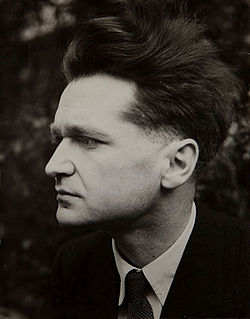A Quote by Mary Wollstonecraft Shelley
Invention, it must be humbly admitted, does not consist in creating out of a void, but out of chaos; the materials must in the first place be afforded; it can give form to dark, shapeless substances, but cannot bring into being the substance itself.
Related Quotes
Most artists are brought to their vocation when their own nascent gifts are awakened by the work of a master. That is to say, most artists are converted to art by art itself. Finding one's voice isn't just an emptying and purifying oneself of the words of others but an adopting and embracing of filiations, communities, and discourses. Inspiration could be called inhaling the memory of an act never experienced. Invention, it must be humbly admitted, does not consist in creating out of void but out of chaos. Any artist knows these truths, no matter how deeply he or she submerges that knowing.
You must read, you must persevere, you must sit up nights, you must inquire, and exert the utmost power of your mind. If one way does not lead to the desired meaning, take another; if obstacles arise, then still another; until, if your strength holds out, you will find that clear which at first looked dark.
In waiting for the glorious moment of that first book contract, writers must have giant reservoirs of patience. Yet they must persevere because they don't know the destiny that is being worked out for them. They creep humbly along the ground, without the spacious aerial vision of their lives that would show them the destiny in store for them.
No doubt science cannot admit of compromises, and can only bring out the complete truth. Hence there must be controversy, and the strife may be, and sometimes must be, sharp. But must it even then be personal? Does it help science to attack the man as well as the statement? On the contrary, has not science the noble privilege of carrying on its controversies without personal quarrels?
You cannot do anything without rousing the masses to action. A plenary meeting of the Soviet must be called to decide on mass searches in Petrograd and the goods stations. To carry out
these searches, each factory and company must form contingents, not on a voluntary basis: it must be the duty of everyone to take part in these searches under the threat of being deprived of
his bread card. We can't expect to get anywhere unless we resort to terrorism: speculators must be shot on the spot. Moreover, bandits must be dealt with just as resolutely: they must be
shot on the spot.
We must have a new mythology, but it must place itself at the service of ideas, it must become a mythology of reason. Mythology must become philosophical, so that the people may become rational, and philosophy must become mythological, so that philosophers may become sensible. If we do not give ideas a form that is aesthetic, i.e., mythological, they will hold no interest for people.
You must be respectful and assenting, but without being servile and abject. You must be frank, but without indiscretion, and close, without being costive. You must keep up dignity of character, without the least pride of birth, or rank. You must be gay, within all the bounds of decency and respect; and grave, without the affectation of wisdom, which does not become the age of twenty. You must be essentially secret, without being dark and mysterious. You must be firm, and even bold, but with great seeming modesty.
The Void is not being, but not being cannot be, ergo the Void cannot be. The reasoning was sound, because it denied the Void while granting that it could be conceived. In fact, we can quite easily conceive things that do not exist. Can a chimera, buzzing in the Void, devour second intentions? No, because chimeras do not exist, in the Void no buzzing can be heard, and intentions are mental things - an intended pear does not nourish us. And yet I can think of a chimera even if it is chimerical, namely, if it is not. And the same with the Void.
We have a duty towards music; namely to invent it. ...Invention presupposes imagination but should not be confused with it. For the act of invention implies the necessity of a lucky find and of achieving realization of this find. What we imagine does not necessarily take on concrete form and may remain in a state of virtuality; whereas invention is not conceivable apart from its actually being worked out.







































